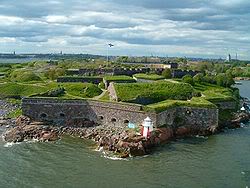
|
Sights to See in Helsinki
The Island Fortresses
Of Suomenlinna
|
Suomen
is actually a derivative of the Finnish word for the people of Finland.
In the Swedish language, they're known as Finns.
Yet, ironically, the
island fortress off the coast was founded by Swedes, yet carries the
Finnish name. Confused?
As late as the mid-18th century, Finland was still a part of the
Swedish kingdom, as it had been for 600 years before.
In 1747, the Diet (ruling council) in Stockholm decided to erect a
fortress on one island to serve as a staging area for military forces
in the region. The goal was to have a local presence to stave off the
Russians, who were already making threatening gestures. The fortress,
called Sveaborg
('fortress of Sweden') was completed some dozen years later.
Rule of the land eventually passed to Russia in 1809 when Finland
became a Grand
Duchy after Sweden ceded the
territory. A deal brokered by Napoleon
between Tsar
Alexander and King Gustav.
Then, shortly after the Bolshevik revolution
in 1917, Finland became a truly independent country and the fortress'
name was changed to Suomenlinna
('Castle of Finland').
But whatever the name signifies, these islands that hold several
related structures - just a short ferry ride from Kauppatori
(Market Square) - are a tourist's delight.
Stretching over different islands, the central fortifications reside on
one (Kustaanmiekka)
that is the main attraction.
As you would expect when visiting such
a site, you will see crumbling stone walls and battlements. What will
surprise you, however, is just how well-maintained the area is, thanks
to the locals.
Despite this care, however, there is evidence everywhere of the action
seen by the fortress over the centuries.
During the Crimean
War (1854-1856) the walls
were shelled by French and British naval vessels beginning on August
9th 1855. For two days the Russian and Finnish inhabitants of Sveaborg endured
the pounding of the allied guns. Though extensive rebuilding was
undertaken, there are many walls, earthworks and other sections that
still show signs of that first 'modern' war.
Despite its bloody history, tourists will find today a beautiful sea
view, grasses dotted with colorful flowers and a number of interesting
museums to explore.
In these more peaceful days, about a thousand people actually live on
the islands, among whom are those who care for (among other things) the
Finnish submarine Vesikko.
The Naval
Academy of Finland is housed
on one of the islands. There's even a prison, though it's not available
for viewing by the general public.
There are buildings that now serve as artists' studios, with many
interesting works on display. During the pleasant days of the Finnish
summer, theatrical performances at Suomenlinna delight both residents
and tourists alike.
On Sarkka
there are additional fortifications and a fine restaurant.
Another provides an interesting church with a lighthouse in the steeple
and a cannon and chain for fencing. And don't miss the famed Kings Gate
which appears on the old Finnish 1000 Finn mark banknote. (The Finnish
Mark was replaced by the Euro in 2002).
Open year 'round, a few of the islands are connected by sandbars and
bridges and a visitor can walk from one to the next. One can explore
the tunnels, then have a bite to eat in one of the many coffee shops or
restaurants located at the site. Check out the pizzeria on the tip of Kustaanmiekka
built into the casement vaults. In the summer, these once war-like but
now peaceful islands make for a particularly fine spot to have a picnic.
Click here
for a great photo tour of the site.
Sitemap
More Sights to See in Helsinki
|

